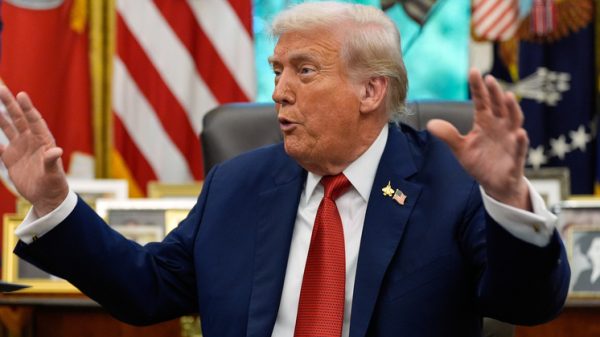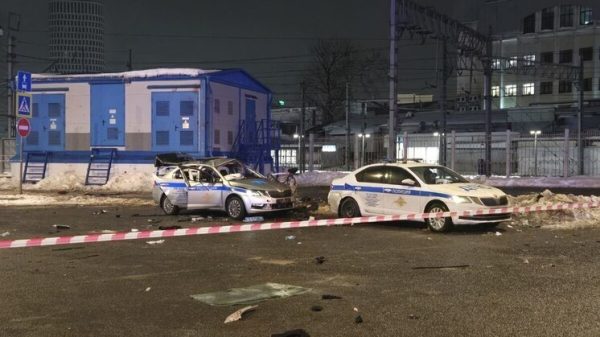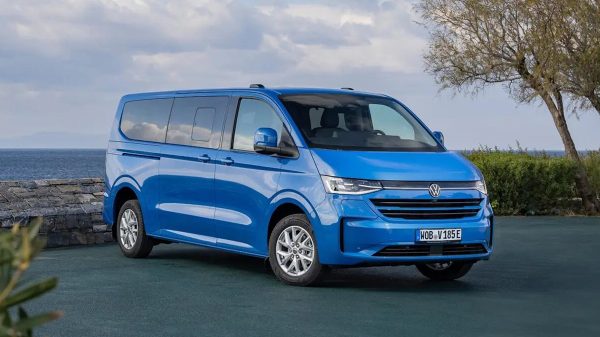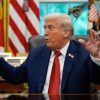
Sofia slips through the streets of her home city in a baseball cap and dark glasses. She must do everything she can to stay under the radar. Her life depends on it.
Sofas belonging to friends are her temporary beds. But they offer little respite in San Pedro Sula, Honduras, where she resides after an epic attempt to reach the relative safety of the US was kiboshed by Donald Trump.
“It’s not much of a life,” she tells the Telegraph under strict conditions of anonymity. “But it’s what I have for now.”
Sofia fled San Pedro Sula, one of the most dangerous cities in the world, after her brother had been killed by one the gangs that rule its streets. They threatened to kill her too.
She travelled more than two thousand miles, mostly on foot, like tens of thousands who joined the ‘caravans’ of people marching to America in recent years.

Hondurans on the migrant trail to the US this year
Credit: Delmer Martinez
But instead of granting her refuge, the US authorities deported her halfway back under a handy new law ordered by the Trump administration.
While Mr Trump’s dreams of a ‘big, beautiful wall’ along the Mexican border have largely failed to materialise, the former businessman has fallen back on his deal-making nouse to keep a major campaign promise to drive down migration.
Through a series of threats and ultimatums to largely impoverished Central American countries, Mr Trump has thrashed out a string of agreements to hold back the tide of people travelling to the US, including forcing Mexico into deploying its military along the migrant trail.
A notable success has been a deal with Guatemala that designates the state as a so-called safe third country for people fleeing persecution.
It requires migrants on their way to the US to apply for protections in Guatemala first, or face deportation back there.
Since the first flights in November last year, the US has deported more than 1,000 Honduran and Salvadoran asylum seekers to Guatemala.
And Sofia was one of them.
Sofia's journey
“They put me on a plane I thought was taking me back to Honduras, but then we landed in Guatemala. I was told I could seek asylum there instead. I was completely lost,” she says.
Guatemala, of course, is itself a country where crime, violence, and lack of economic opportunity has driven hundreds of thousands to flee.
“Safe in Guatemala?” asks Sofia. “What’s safe about that place? It’s the same as Honduras.”
“I don’t know anyone in Guatemala. I had to come home. It’s dangerous for me here, but at least I have friends who can help me.”
Mr Trump’s ‘safe third country’ agreement with Guatemala has echos of a deal between the European Union and Turkey in 2016 to stem the flow of migrants fleeing the civil war in Syria in record numbers.
But while Turkey received cash handouts from the EU in return, Guatemala merely avoided a string of Trump threats including cutting existing aid, cranking up tariffs and banning Guatemalans in the US from sending money home to their families.
Critics call it blackmail, no less.

Trump has rallied around his wall, but his most success in preventing migration has come from shadowy deals with poverty-stricken Central America
Credit: REUTERS
It is this style of diplomacy, which has frayed relations across Latin America. Washington’s approach under Mr Trump has been one of confrontation, rather than engagement or partisanship. One senior Colombian diplomat, who asked not to be named, said the continent’s relations with the US are on “life support”.
Threats of damaging tariffs also helped produce the signature “Remain in Mexico" policy in January 2019. Like the third country asylum agreement with Guatemala, the policy forces individuals seeking refuge in the US to return to Mexico – for an indefinite amount of time – while their claims are processed.
Meanwhile, inside the US, the Trump administration has followed a “zero tolerance” policy on migrants crossing illegally. As a result many families were separated, triggering one of the most controversial episodes in the president’s tenure.
Leaked pictures of children locked in ‘cages’ without parents or family members shocked the world. Melania Trump famously exacerbated the crisis when she arrived at the border wearing a jacket with the words: "I really don’t care, do you?" She later claimed it was an ironic gesture to the ‘fake news’ liberal media.

Melania Trump, on a trip to visit child migrants detained on the border, wore a jacket saying: 'I really don't care. Do you?'
Credit: AFP
The ‘zero tolerance’ approach eventually meant thousands of asylum seekers became trapped on Mexico’s side of the border in overwhelmed migrant shelters.
In some cases the policy led to even more desperate attempts to illegally cross into the US using more dangerous routes. An image of the lifeless bodies of Oscar Ramires and his 2-year-old daughter lying face down in the muddy banks of the Rio Grande shocked the world.
But that was more than a year ago.
Last week, Washington pledged to admit a record low of no more than 15,000 refugees over the coming year. It is perhaps therefore no surprise that anti-American sentiment has grown in this part of the world since President Trump came to power.
Karen Musalo, founding director of the Center for Gender and Refugee Studies at the University of California’s Hastings Law School, is one of the lawyers challenging the asylum agreement with Guatemala in US federal court.
“To pretend that Guatemala, Honduras and El Salvador are safe is divorced from reality and it is in violation of US law, which stipulates third countries must have a full and fair asylum system for determining refugee status. These countries do not,” she said.
“These countries are recognised as origin countries with huge levels of homicide, femicide, gang violence and organised crime. On top of that, these countries suffer from issues directly related with climate change like drought as well as unusually strong storms and flooding. These are countries that barely have enough resources for their own citizenry.”
Migration is not the only issue to have drawn a wedge between the US and its southern neighbours. Curbing the flow of illicit drugs from Latin America and the Caribbean has been a key component of US relations with the region for decades. But under Mr Trump, Washington’s approach has become adversarial, accusing Colombia of failing to stop the flow of drugs to the US.
Elsewhere, Mr Trump has installed an ally as the Head of the Inter-American Development Bank, the first time it has not been headed by a Latin American since it was created in 1959.
Analysts say it is a move to counter Chinese influence in the region. Diplomats fear future loans will now come with even more political baggage.
Mr Trump’s position on Venezuela and Cuba has also divided Latin America. The Trump Administration has imposed financial sanctions on both countries. On Cuba, Washington has abandoned the policy of engagement advanced during the Obama Administration.

Trump's national security adviser made a clumsy attempt to threaten Venezuela by holding a notepad clearly saying: '5,000 troops to Colombia'
Credit: REUTERS
Mr Trump’s hawkish stance has helped him win over many crucial Latino voters in Florida, a key swing state, however.
“Venezuela and Cuba have consistently been the key issues on Trump’s agenda and both are at the core of right-wing concerns in the United States,” said Arlene Tickner, a professor of international relations at Bogotá’s El Rosario University.
Back in San Pedro Sula, the first migrant caravan since the global pandemic set off for Mexico on October 30. More than 3,000 Hondurans gathered near the city’s bus station before beginning their long trek north.

The migrant caravan containing Daniel Midence came up against police in Guatemala
Credit: Delmer Martinez
Among them was 24-year-old Daniel Midence, departing on his eighth attempt to reach America.
“There are no jobs here. I have nothing. The only option is to join a gang, but that’s for bad people and I want to be a good person,” he says. “So I’m leaving to try and make some money.
“Trump can do what he likes,” he adds. “But he’s never gonna stop people coming.”
Four days after he crossed the border into Guatemala, authorities there dubiously announced that 3,586 migrants had “opted to return”.
Hundreds more trekked on to Mexico. It is not known whether Daniel is among them.
Additional reporting by Claudio Escalón
- This is part four of our series on how Donald Trump has changed the world, return to Telegraph.co.uk on Thursday morning for part five, on how communists are ready to pounce on Trump’s efforts to stand up to Asia
- Read Wednesday’s instalment: ‘I would hug him despite Covid’ — meet Donald Trump’s biggest foreign fans




















































Свежие комментарии